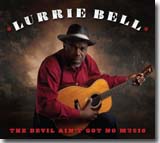 Blues
guitarist Lurrie Bell, son of the late blues
harmonica legend Carey Bell, grew up around the
Chicago blues scene and became one of its newer
generation of blues artists when he formed The Sons
of the Blues with Freddie Dixon and Billy Branch in
1977. But prior to that he left Chicago as a young
boy to live in the Deep South wit his grandparents,
where he learned to play gospel (albeit with an
underlying blues sound).
Blues
guitarist Lurrie Bell, son of the late blues
harmonica legend Carey Bell, grew up around the
Chicago blues scene and became one of its newer
generation of blues artists when he formed The Sons
of the Blues with Freddie Dixon and Billy Branch in
1977. But prior to that he left Chicago as a young
boy to live in the Deep South wit his grandparents,
where he learned to play gospel (albeit with an
underlying blues sound).
Bell returns to those gospel roots with the
wonderful CD, The Devil Ain't Got No Music
(Aria B.G. Records). This is back country gospel at
its finest, mostly unadorned, loving renditions of
traditional gospel numbers with a few more recent
compositions mixed in.
The disc opens with the traditional spiritual "Swing
Low," on which Bell's guitar and vocals are
accompanied only by Kenny "Beedy Eyes" Smith's
rhythmic percussion and hand claps from Bill Sims
Jr. The emphasis here is on Bell's voice, which has
aged into a nice rich, charcoal timbre. It's an
effective way to start the album, setting the tone
for the 11 numbers to follow.
Blues star Joe Louis Walker makes his first of three
appearances on "It's a Blessing," sharing vocals
with Bell and adds exquisite slide guitar. JLW's
singing is more in a call and response with Bell, as
the latter takes the lead vocals on this traditional
number. Walker also handles the slide guitar work on
a sublime version of Thomas Dorsey's "Peace In The
Valley," performed at dirge-like tempo --- a really
beautiful number.
Walker's final appearance comes on his own
composition, "I'll Get To Heaven On My Own," which
he originally recorded for his 1989 album Blue
Soul. Bell handles the vocals and some limited
guitar accompaniment, while Walker contributes
backing hoots and hollers as well as hand claps and
testifying. This is one of my favorite cuts ---
simple but extremely powerful.
"Way Down In The Hole" is a stark, haunting version
of the Tom Waits song, with Smith pounding out the
beat on a lone drum while Cynthia Butts adds eerie
background vocals.
Dorsey's "Search Me Lord" shows Bell's amalgamation
of blues rhythms with traditional gospel, as he
intersperses nice Piedmont-style guitar picking with
the harmonizing backing vocals of Mike Avery and
James Teague. Bell uses some of the same blues
guitar chords on Oris Mays' standard "Don't Let The
Devil Ride" and the up-tempo Muddy Waters number
"Why Don't You Live So God Can Use You," the latter
which was originally recorded in 1942 for the
Library of Congress (search on YouTube to hear Mr.
Morganfield's version).
The biggest ensemble of musicians gathers for Bell's
rendition of the traditional "Trouble In My Way,"
which starts out sounding more like a Chicago blues
thanks to Billy Branch's harmonica playing. Josef
Ben Israel backs up on bass, with Smith on drums and
Avery and Teague returning for background vocals.
This slow number shows the marriage of blues and
gospel better than any other tune on the album.
Bell goes solo, with the only accompaniment to his
more resonant vocals being his meticulous guitar
picking, on the closing number, "Death Don't Have No
Mercy." This slow number is a nice ending to a very
good album.
The Devil Ain't Got No Music is certain to
rank as one of the best albums of the year. Whether
you're a fan of Chicago blues, traditional acoustic
blues or down home gospel, this one should be
labeled as a "must buy"!
--- Bill Mitchell
 Studebaker John Grimaldi couldn’t have found
a more appropriate title, Old School Rockin’,
for his new Delmark release. He’s been a mainstay on
the Chicago blues scene since the ’70s, learning to
play slide guitar after seeing Hound Dog Taylor
perform. His searing slide work, plus his raw
harmonica sound, and his distinctive vocals (similar
to John Hiatt), combined with his songwriting
skills, are a potent combination.
Studebaker John Grimaldi couldn’t have found
a more appropriate title, Old School Rockin’,
for his new Delmark release. He’s been a mainstay on
the Chicago blues scene since the ’70s, learning to
play slide guitar after seeing Hound Dog Taylor
perform. His searing slide work, plus his raw
harmonica sound, and his distinctive vocals (similar
to John Hiatt), combined with his songwriting
skills, are a potent combination.
Grimaldi wrote all 14, including the riproaring
opener, “Rockin’ That Boogie.” Other highlights
include the swampy rockers, “Disease Called Love”
and “Rockin’ Hot,” the veritable slidefest, “Fine
Little Machine,” and “She Got It Right.”
“Mesmerized” has a Latin flavor to it and is a nice
change of pace on the disc, mixing well with the
churning rockers like “Brand New Rider,” “On the
Down Low,” and “Fire Down Below.” “Dark Night” is a
pretty straightforward blues number with atmospheric
slide work reminiscent of Sonny Landreth, and the
hypnotic Hill Country rocker, “Tumblin’ Down the
Road,” closes the disc with a bang.
Special notice must go to the supporting cast (Bob
Halaj – bass, Albert “Joey” DiMarco – drums, plus
Doug Organ – Hammond B3 on “Fire Down Below”). They
provide top of the line backing and give Studebaker
John plenty of room to shine, and shine he does. If
you’re not familiar with this exciting artist, this
first-rate set is a great place to start.
--- Graham Clarke
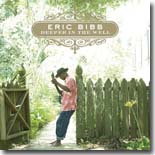 The way I see it, Eric Bibb had to be a
musician. For starters, his father is folk singer
Leon Bibb. Next, his uncle was jazz pianist John
Lewis of the Modern Jazz Quartet. His godfather was
the legendary singer/actor/activist Paul Robeson,
and selected houseguests included people like Odetta,
Pete Seeger, and Bob Dylan, so, yeah, all of these
things had to figure in somewhere down the road.
Bibb got his first guitar at age seven, was soon
attending NYC’s High School of Music and Art, and at
16 was playing guitar in the house band for his
dad’s local TV talent show.
The way I see it, Eric Bibb had to be a
musician. For starters, his father is folk singer
Leon Bibb. Next, his uncle was jazz pianist John
Lewis of the Modern Jazz Quartet. His godfather was
the legendary singer/actor/activist Paul Robeson,
and selected houseguests included people like Odetta,
Pete Seeger, and Bob Dylan, so, yeah, all of these
things had to figure in somewhere down the road.
Bibb got his first guitar at age seven, was soon
attending NYC’s High School of Music and Art, and at
16 was playing guitar in the house band for his
dad’s local TV talent show.
Bibb has been very prolific in the studio, releasing
over 20 albums over the past 15 years, a
consistently fine and diverse catalog that shows a
musician who is not afraid to venture out into new
directions, but always mindful of keeping the blues
at the root of whatever he does. His latest release,
and his first for Stony Plain Records, is a
marvelous example of that quality.
Deeper in the Well finds Bibb immersed in the
music of Louisiana, a musical genre unto itself
that, like Bibb, has always incorporated old musical
styles with new styles, while still keeping
maintaining its own unique quality at the root.
Joining Bibb on this endeavor are several
outstanding musicians who know a thing or two about
the music of the Bayou State, including
multi-instrumentalist Dirk Powell (banjo, fiddle,
mandolin, accordion, and upright bass), Grant
Dermody (harmonica), Cedric Watson (fiddle), Danny
DeVillier (drums and tambourine), and Christine
Balfa (Cajun triangle). Stopping by to help out on a
few tracks are Jerry Douglas (dobro), Michael Jerome
Browne (fretless gourd, mandolin, and guitar), and
Michael Pepin (guitars).
Bibb wrote seven of the 13 tracks, including the
opening track, “Bayou Babe,” as smooth a slice of
funky, unplugged Crescent City R&B as you’ll hear.
“Money in Your Pocket” addresses the plight of the
homeless. “In My Time” is a lovely autobiographical
track that features Bibb and Douglas, and “Sittin’
in a Hotel Room” finds Bibb advocating the itinerant
life of a musician.
The remainder of the songs are traditional tunes
(including the delightful title track and a moving
version of “Sinner Man”), plus Taj Mahal’s “Every
Wind In The River,” and a couple of tunes that focus
on social commentary….a slowed-down version of
Dylan’s “The Times They Are A Changin’” and Harrison
Kennedy’s “Could Be You, Could Be Me.” These two
tracks go well with Bibb’s own “Movin’ Up.”
Deeper in the Well is a lovely, relaxed
session that features excellent musicianship and a
strong mix of original tunes and well-chosen covers.
Eric Bibb rarely, if ever, disappoints with his
recordings and you will find that this is no
exception to the rule.
--- Graham Clarke
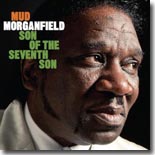 The first thing you’ll notice on the cover of Mud
Morganfield’s new release for Severn Records,
Son of the Seventh Son, is how much he looks
like his father, Muddy Waters. However, the next
thing you’ll notice is how much he sounds like his
father. Morganfield was a late comer to the blues
scene, at least publicly. Waters bought him his
first set of drums when he was seven, and he’s been
singing since the ’80s, but not publicly until 2005,
when called onstage by singer Mary Lane. After that
experience, he decided to pursue music as a
profession, making a memorable appearance at the
2007 Chicago Blues Festival.
The first thing you’ll notice on the cover of Mud
Morganfield’s new release for Severn Records,
Son of the Seventh Son, is how much he looks
like his father, Muddy Waters. However, the next
thing you’ll notice is how much he sounds like his
father. Morganfield was a late comer to the blues
scene, at least publicly. Waters bought him his
first set of drums when he was seven, and he’s been
singing since the ’80s, but not publicly until 2005,
when called onstage by singer Mary Lane. After that
experience, he decided to pursue music as a
profession, making a memorable appearance at the
2007 Chicago Blues Festival.
On his latest release, Morganfield finds himself in
the capable hands of producer Bob Corritore, who
knows a thing or two about vintage Chicago Blues.
Also participating is an impressive all-star quality
list of Chicago players, including Rick Kreher and
Billy Flynn on guitar, Barrelhouse Chuck on
keyboards, E. G. McDaniel on bass, Kenny “Beedy
Eyes” Smith on drums, and Corritore and Harmonica
Hinds alternating on harp.
Morganfield also wrote seven of the 12 tracks on the
disc, highlighted by such strong selections as “Love
To Flirt,” “Catfishing,” “Loco Motor,” “Midnight
Lover,” and “Blues In My Shoes.” The other
contributions come from J.T. Brown (the rousing
opener, “Short Dress Woman,” a Waters favorite),
Studebaker John’s moody title track, Flynn’s
shuffle, “Money (Can’t Buy Everything),” Corritore’s
“Go Ahead and Blame Me,” and one from the old man
himself, “You Can’t Lose What You Ain’t Never Had.”
Morganfield sounds great on these tracks…..some of
his vocal inflections are amazingly identical to his
father’s and will bring a knowing nod and a smile to
blues fans’ faces when they hear them. The band is
nothing short of fantastic, and Corritore manages to
make the traditional sound brand new with his
production. As Bill Mitchell pointed out here last
month, you will find Son of the Seventh Son
on plenty of Top Ten lists at the end of the year.
--- Graham Clarke
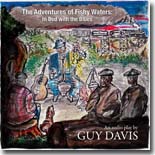 Guy Davis grew up listening to stories told
by his family, which included his parents, actors
Ossie Davis and Ruby Dee, and his grandparents.
These stories, as well as Davis’ own experiences
over the years as a blues musician, played a major
part in his most recent project, the two-CD audio
play, The Adventures of Fishy Waters: In Bed With
The Blues (Smokeydoke Records).
Guy Davis grew up listening to stories told
by his family, which included his parents, actors
Ossie Davis and Ruby Dee, and his grandparents.
These stories, as well as Davis’ own experiences
over the years as a blues musician, played a major
part in his most recent project, the two-CD audio
play, The Adventures of Fishy Waters: In Bed With
The Blues (Smokeydoke Records).
Actually, this is not so new a project….Davis began
writing it while serving as an understudy in
Mulebone, the Zora Neale Hurston/Langston Hughes
collaboration that appeared on Broadway in the early
’90s. In 1994, Davis got the opportunity to showcase
his project at the Off Broadway, Henry Street
Settlement, for a week’s run. It received critical
praise from the New York Times and Village Voice,
and Davis has performed it subsequently whenever
he’s had the opportunity. Now, he’s taken the time
to release it on CD to what will hopefully be a much
wider audience.
The play is a mixture of song and narration. Davis
seamlessly blends some well-done original
compositions with a few choice covers from Robert
Johnson (“Walking Blues”), Big Bill Broonzy (“Good
Liquor Gonna Carry Me Down”), Blind Willie McTell
(“Georgia Rag”), and Reverend Gary Davis (“Candy
Man”). The narrations range from descriptions of
everyday life as a traveling musician to character
studies of people Fishy Waters encounters to
humorous stories to a few harrowing tales about
inhuman conditions that were a part of life during
the time covered. Davis does a wonderful job vividly
bringing all of this to life.
Though the graphic realism of a few of the
narrations don’t make for easy listening, the music
is great and Guy Davis’ latest project should be
required listening for blues fans, because it
provides a valuable look at the history of the early
blues musicians. Hopefully, he will get the chance
to present this onstage to a wider audience as a
result.
--- Graham Clarke
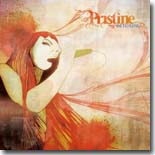 The Norwegian band Pristine received a lot of
attention and positive press at this year’s
International Blues Challenge with their skillful
mix of blues, soul, funk, jazz, and psychedelic
rock. The release of their latest CD, Detoxing
(BluesNews Records) coincided with the competition
and I can tell you from listening that all of the
above elements are included in their sound. I can
also tell you that it works…..baby, does it work!
The Norwegian band Pristine received a lot of
attention and positive press at this year’s
International Blues Challenge with their skillful
mix of blues, soul, funk, jazz, and psychedelic
rock. The release of their latest CD, Detoxing
(BluesNews Records) coincided with the competition
and I can tell you from listening that all of the
above elements are included in their sound. I can
also tell you that it works…..baby, does it work!
Led by charismatic lead singer Heidi Solheim,
Pristine’s band (Espen Elverum Jakobsen – guitar,
Anders Oskal – Hammond and Clavinet, Asmund Wilter
Eriksson – bass, Kim Karlsen – drums) is an
impressive unit, making these styles blend
effortlessly. Solheim wrote eight of the nine tunes
on Detoxing. The opening cut, “Damned If I
Do,” is an unusual, but attention-getting opener.
Reminiscent of the ’60s psychedelic blues/rock, it
starts with Solheim’s breathy vocal over Oskal’s
eerie Hammond, and then segues into Jakobsen’s
fierce guitar with Solheim matching his intensity as
the song closes. Powerful song.
“Breaking Bad” is another highlight, a good old
Texas-style shuffle with some inspired guitar work.
The band also delves into deep soul on “Damage is
Done,” driven by Oskal’s churchy B3, which also
features a nice vocal turn from Solheim. “The Last
Day” is another soulful ballad that features Solheim
and pairs Jakobsen with Norwegian
singer/songwriter/guitarist Knut Reiersrud on
guitar, and the title track brings the psychedelic
elements back to the front, and transforms you back
to late ’60s San Francisco.
Covering an Allman Brothers tune, especially one
like “Whipping Post,” usually requires a large
amount of courage for most bands, but Pristine takes
a different bent, stripping the song back to the
basics and wisely not trying to match the originals
fire and intensity, instead taking an understated,
but successful approach.
Detoxing is an excellent set that becomes
even better the more you listen to it, a good
quality for a blues album to have. The blend of
musical elements with the traditional blues works
really well. It will be interesting to hear where
Pristine goes from here.
--- Graham Clarke
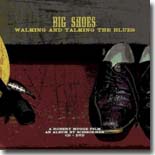 For several years now, Scissormen have been
attracting a solid base of fans who are appreciative
of their high energy mix of Mississippi Delta Blues
with Hill Country Blues, and a shot of psychedelic
rock thrown in for good measure. Now, the band’s
energy and personality has been captured on film.
Big Shoes: Walking and Talking the Blues (VizzTone)
is a two disc set, a movie by acclaimed filmmaker
Robert Mugge (Deep Blues, Gospel According
to Al Green, Last of the Mississippi Jukes,
Saxophone Colossus), accompanied by a CD
recorded in Redkey, Indiana at the Key Palace
Theatre during the filming of the movie.
For several years now, Scissormen have been
attracting a solid base of fans who are appreciative
of their high energy mix of Mississippi Delta Blues
with Hill Country Blues, and a shot of psychedelic
rock thrown in for good measure. Now, the band’s
energy and personality has been captured on film.
Big Shoes: Walking and Talking the Blues (VizzTone)
is a two disc set, a movie by acclaimed filmmaker
Robert Mugge (Deep Blues, Gospel According
to Al Green, Last of the Mississippi Jukes,
Saxophone Colossus), accompanied by a CD
recorded in Redkey, Indiana at the Key Palace
Theatre during the filming of the movie.
Frontman/songwriter/singer/slide guitarist
extraordinaire Ted Drozdowski has been a part of the
blues scene for over 30 years, first as a writer
(winning the Blues Foundation’s Keeping The Blues
Alive Award for Journalism in 1998) and consultant
for various film projects (including Martin
Scorsese’s “The Blues” PBS series.), but also as a
musician. Along the way, he developed a stunning
slide guitar style that takes in both Elmore James
and Sonny Sharrock. Drummer R.L. Hulsman, who is
featured on the movie, actually left Scissormen and
has been since replaced by Matt Snow.
The goal of the film, according to Mugge, was to
demonstrate how Drozdowski honors past master of the
blues (Mississippi Fred McDowell, R.L. Burnside,
Jessie Mae Hemphill, Junior Kimbrough, etc…) while
also doing his part to guarantee the continued
development of the music those masters had such a
hand in creating. as summarized by the title track,
described by Drozdowski as a “blues protest number.”
Part of the film was recorded in Redkey, with
additional scenes filmed at the famous Slippery
Noodle Inn in Indianapolis during a slide guitar
workshop, and at the Beachland Ballroom and Tavern
in Cleveland, OH.
About half the songs (“Tupelo,” the
McDowell-influenced “Mattie Sweet Mattie,” “The
Devil is Laughing,” the Jessie Mae Hemphill-inspired
“Move Baby Move,” “When the Devil Calls,” “Whiskey
and Maryjane”) will be familiar to the duo’s fanbase,
but there are some interesting new songs, too. There
are a couple of biographical tracks about Burnside
(“R.L. Burnside,” about a night Drozdowski spent
with the bluesman that inspired him to form
Scissormen) and Hemphill (“Jessie Mae”). “Delta
Train” is a moody piece loaded with vivid imagery
and some scorching slide work.
The non-concert footage features Drozdowski and
Hulsman talking with Key Palace Theatre owner
Charlie Noble, Slippery Noodle owner Hal Yeagy and
Beachland owner Cindy Barber about their respective
clubs and their histories, and also the current
state of the blues in Indiana and in general. They
also visit Richmond, Indiana, home of Gennett
Records, the legendary label that recorded many
blues and jazz artists in the ’20s and ’30s.
Drozdowski’s background as a journalist comes in
handy. He is the perfect host for the tour,
narrating as he drives from place to place, setting
the stage for the next scene, talking about how he
was inspired to play, and never taking himself too
seriously…he looks like he’s having a blast, whether
on stage or just hanging out. While he’s an
excellent performer and musician, he’s still as much
a fan as he ever was, something us laymen can
definitely relate to while watching. If you weren’t
a fan of Scissormen before you tune into Big
Shoes: Walking and Talking the Blues, you will
be once you watched.
--- Graham Clarke
 Mary Bridget Davies has been singing the
blues since 2002, when she appeared with Robert
Lockwood Jr. at a blues jam in her hometown of
Cleveland, OH. She formed her own band around 2005
and they represented the Rock and Roll Hall of Fame
twice at the IBC’s. Also, in 2005, she won the lead
to the Off-Broadway musical, Love, Janis.
She’s also toured with Janis Joplin’s old band, Big
Brother and the Holding Company, in the U.S. and in
Europe. She’s also performed in the Broadway
musical, It Ain’t Nothin’ But The Blues.
Mary Bridget Davies has been singing the
blues since 2002, when she appeared with Robert
Lockwood Jr. at a blues jam in her hometown of
Cleveland, OH. She formed her own band around 2005
and they represented the Rock and Roll Hall of Fame
twice at the IBC’s. Also, in 2005, she won the lead
to the Off-Broadway musical, Love, Janis.
She’s also toured with Janis Joplin’s old band, Big
Brother and the Holding Company, in the U.S. and in
Europe. She’s also performed in the Broadway
musical, It Ain’t Nothin’ But The Blues.
In 2010, she relocated to Kansas City and recorded
her debut album, Wanna Feel Somethin’, a
solid recording that puts all of Ms. Davies vocal
talents on display. Davies and the band composed
seven of the ten tracks and their originals are
strong, touching on familiar subjects, but retaining
a freshness. Highlights include “Your Kinda Love,”
“Won’t Pay You No Mind,” the soulful “Real Thing,”
and a pair of Delta-flavored tracks (“Getting’
Stronger” and “Trick The Devil”). The bouncy title
track is another standout.
Davies also reinvents three choice covers. Noel
Gallagher’s “Wonderwall” is given a jazzy makeover.
The Eagles’ “Take It To The Limit” and Chi
Coltrane’s “Thunder and Lightnin’” also get
successful transformations.
Another highlight of the disc is the seamless
interplay between Davies and her band (Dave Hayes –
guitar/vocals, Gary Roberts – bass/vocals, Chris
Hazelton – keyboards/vocals, Joe Voye –
drums/vocals, Pete Carroll – trumpet/vocals, Mick
Rowland – sax/vocals, and Aaron Thomas –
tambourine). Their support, both in songwriting and
musicianship, makes a good album great.
Davies shows her vocal talent and versatility on
Wanna Feel Somethin’. It’s an excellent debut
release that shows tons of potential for this
up-and-coming artist.
--- Graham Clarke
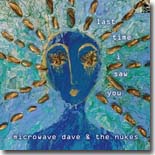 Microwave Dave & the Nukes have been playing
their brand of hard-rocking, good time blues since
1989. Those years included a three-year stint
backing Jerry “Boogie” McCain and various gigs with
Bo Diddley mixed in. Both artists figure prominently
into the band’s sound. Last Time I Saw You is
the band’s seventh and latest release, and it
features ten well-crafted originals with a couple of
well-chosen covers (the track “Hydraulic Grind” is
13 seconds of a Dodge van winch that precedes
the rousing “All Nite Boogie”).
Microwave Dave & the Nukes have been playing
their brand of hard-rocking, good time blues since
1989. Those years included a three-year stint
backing Jerry “Boogie” McCain and various gigs with
Bo Diddley mixed in. Both artists figure prominently
into the band’s sound. Last Time I Saw You is
the band’s seventh and latest release, and it
features ten well-crafted originals with a couple of
well-chosen covers (the track “Hydraulic Grind” is
13 seconds of a Dodge van winch that precedes
the rousing “All Nite Boogie”).
Guitarist/singer/songwriter Microwave Dave Gallaher
uses wit and humor on his compositions, including
the funky opener, “Drinkin’ Wine Since Nine,” and
the shuffle, “Jesus Was Smart” (definitely an
approach never used on a blues song previously), and
the double-entendre-laden “Tire Man,” which also
features Gallaher on drums and cigar-box guitar.
The band explores other directions on tracks like
“Goin’ Downtown,” a Hill Country romp, the rocking
“Cadillac Ride,” and “Vagabundos,” a surf guitar
workout. Billy C. Farlow’s “Alabama Saturday Night”
chugs along with that famous Bo Diddley beat, and
the title track ventures toward swamp pop territory.
The closing instrumental, “Rafferty,” channels Jimi
Hendrix.
The Nukes (Rick Godfrey – bass/harmonica, James
Irwin (drums, percussions) are skin tight, and
Gallaher is a force of nature when he picks up his
guitar. Microwave Dave & the Nukes have been getting
it right for over 20 years, and Last Time I Saw
You is another fine addition to an already
impressive body of work.
--- Graham Clarke
 Talk about coming up the hard way, Suzanne Thomas
did just that, starting out as an abandoned biracial
child in Seoul, South Korea and nearly being killed
because of her mixed heritage. Fortunately, at the
age of five, she was adopted by an African-American
family and brought to the United States. At six, she
began studying organ under a fairly talented
musician, the legendary Jimmy Smith, but eventually
became more interested in the music of Jimi Hendrix,
a family favorite, and took up the guitar in her
twenties. She was soon playing with several funk and
R&B bands, including A Taste of Honey, before
turning to the blues.
Talk about coming up the hard way, Suzanne Thomas
did just that, starting out as an abandoned biracial
child in Seoul, South Korea and nearly being killed
because of her mixed heritage. Fortunately, at the
age of five, she was adopted by an African-American
family and brought to the United States. At six, she
began studying organ under a fairly talented
musician, the legendary Jimmy Smith, but eventually
became more interested in the music of Jimi Hendrix,
a family favorite, and took up the guitar in her
twenties. She was soon playing with several funk and
R&B bands, including A Taste of Honey, before
turning to the blues.
Now performing as Suzanne and the Blues Church,
Thomas has released her debut effort on the Gorgeous
Tone Music label. The Cost of Love is a
dynamite set with ten tracks, eight enticing
originals and two well-chosen covers. Backed by a
superlative cast of musicians, including Ray Bailey
(guitar, bass, drums, vocals), Jerry Jones-Haskins
(drums), Frank W. Garrett (bass), Patrice (bass),
Bruce Edwards (organ and Fender Rhodes), “Rev”
Charles Jones (B-3). Tyree (organ), BR Millon
(guitar), and Jimmy “Z” (harmonica), Thomas plays
with unbridled verve and passion not ordinarily
associated with a debut release.
She wrote or co-wrote seven of the ten tracks. They
touch on topical themes, especially the eternal
quest for more money. Highlights include the jazzy
opener, “Cheatin’ on Me,” a smooth pair of shuffles
(the title track and “Pay Day Loan”), and the funky
“Poor Man’s Dream” is a standout among the
standouts. “Dusty 6 String Box” is a spoken-word
narrative with some excellent guitar work by Bailey
and Millon. The aching slow blues, “Set Me Free,” is
another winner, and the closer, “Mr. Bailey,” ends
things on a high note.
The covers are Otis Rush’s “All Your Love (I Miss
Lovin’),” pepped up and driven by Jimmy “Z”’s strong
harmonica backing, and Buddy Guy’s “Damn Right (I
Got The Blues),” which actually sounds better to me
than the Guy original, thanks to Thomas’ strong
vocal performance.
The Cost of Love is an impressive debut
effort from Suzanne and the Blues Church. I have a
feeling we will be hearing much more from Ms. Thomas
in the future, so go ahead and join her congregation
now.
--- Graham Clarke
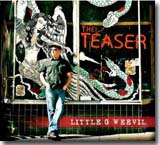 Little G Weevil started out playing drums,
but moved to guitar at age 17, influenced by
legendary blues artists like John Lee Hooker,
Lightnin’ Hopkins, Albert Collins, B.B. King, and
Chuck Berry. He started his own band in the late
’90s, touring in Europe and recording while there,
but eventually settling in Memphis, where he became
a mainstay on Beale Street until relocating to
Kennesaw, Georgia a few years ago. The Teaser (Apic
Records) is his second solo release and offers a
great selection of Southern-based blues.
Little G Weevil started out playing drums,
but moved to guitar at age 17, influenced by
legendary blues artists like John Lee Hooker,
Lightnin’ Hopkins, Albert Collins, B.B. King, and
Chuck Berry. He started his own band in the late
’90s, touring in Europe and recording while there,
but eventually settling in Memphis, where he became
a mainstay on Beale Street until relocating to
Kennesaw, Georgia a few years ago. The Teaser (Apic
Records) is his second solo release and offers a
great selection of Southern-based blues.
Throughout the album, there’s some stellar interplay
between Weevil on guitar and harmonica player
Maurice Nazzaro, especially on the opening cut,
“Real Men Don’t Dance,” “Highway 78” and, most
impressively, on “Liquor Store.” Other highlights
include the funky “Big City Life,” which features
more great guitar, plus a nice turn from Bob Page on
organ.
“Front Porch” is a nice change of pace….a stark
number featuring Weevil solo on guitar (another solo
track is “Dad’s Story,” Weevil’s tribute to his
father). He gets another chance to shine on guitar
with the slow blues number, “Apple Picker.” “8:47,”
a track lamenting low wages for lots of work,
features a defiant vocal from Weevil and some of his
best guitar work. “She Used To Call Me Sugar,” is a
nice after-hours blues on the jazz side. The rousing
autobiographical closer, “Which Way Shall I Go,”
showcases the guitarists’ slide work.
Weevil gets excellent support from Nazzaro
(harmonica), Page (piano and organ), Bill Burke
(bass), and John V. McKnight (drums, percussion). He
wrote all 12 tracks (McKnight co-wrote “Highway 78”)
and they are a mix of the traditional blues subject,
but most of them have a personal twist to them.
The Teaser is a great set of no-frills blues
that will please any traditional blues fan.
--- Graham Clarke
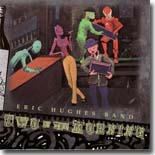 From Memphis comes The Eric Hughes Band, a
mainstay on the Beale Street Blues scene for over a
decade. On his recent release for I55 Productions,
Two in the Morning, Hughes plays lead and
rhythm guitars, dobro, electric sitar (!),
harmonica, percussion, and sings. We can probably
safely assume he cooks BBQ and saves kittens stuck
in trees in his spare time.
From Memphis comes The Eric Hughes Band, a
mainstay on the Beale Street Blues scene for over a
decade. On his recent release for I55 Productions,
Two in the Morning, Hughes plays lead and
rhythm guitars, dobro, electric sitar (!),
harmonica, percussion, and sings. We can probably
safely assume he cooks BBQ and saves kittens stuck
in trees in his spare time.
Hughes is backed by a strong set of the Bluff City’s
finest musicians, including Laura Hughes on bass,
Kevin Eddy on drums, Robert “Nighthawk” Tooms on
keyboards, and Brad Webb and Larry Nobles playing
lead guitar on selected tracks. Oh yeah, Hughes also
penned all 14 tracks, and there are some memorable
ones. Hughes has a great sense of humor, as
witnessed on tracks like the opener, “Did You Have
to Take the Dog, Too?” and a similar situation
involving his beloved “Muddy Waters Records,” and
the hilarious rockabilly track, “Teeth in a Glass.”
Some other standout tracks include “Along Came You,”
“Chevy 2 Door,” the acoustic Delta-flavored
“Volkswagen Blues” and “Furry’s Gravesite Blues,”
and the countrified “Who’d Clean up the Mess?”
There’s also a fine pair of instrumentals,
“Breakdown in the Briar Patch” (which serves as a
sign-off track, prior to the band’s “encore” for two
more tracks) and “Wet Ribs,” which closes the disc.
As you can probably assume, Hughes is something
special as a composer, giving each track a highly
personal touch, but never taking himself too
seriously in the process. Two in the Morning
is a disc you’ll find yourself listening to over and
over to see what you missed the last time you
listened….then you’ll make a point to see these guys
live. A band that is this much fun on disc has to be
a blast to hear live.
--- Graham Clarke
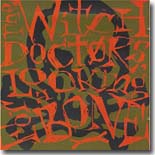 Most of the musicians that comprise The
WitchDoctors have been a part of the Memphis
music scene for many years. Don Cook (lead
vocals/lead guitar) and Brad Webb (slide guitar) go
back nearly 40 years with the band, TarBaby. The
remainder of the group consists of Blind Mississippi
Morris (harmonica), John Burgess and Pete Mendillo
(drums), Suzanne Buel (lead/background vocals), Dan
Cochran, Tom Mial, and Guy Venable (bass), Mark
Crawley (keyboards), and Russell Wheeler (Hammond
B3).\
Most of the musicians that comprise The
WitchDoctors have been a part of the Memphis
music scene for many years. Don Cook (lead
vocals/lead guitar) and Brad Webb (slide guitar) go
back nearly 40 years with the band, TarBaby. The
remainder of the group consists of Blind Mississippi
Morris (harmonica), John Burgess and Pete Mendillo
(drums), Suzanne Buel (lead/background vocals), Dan
Cochran, Tom Mial, and Guy Venable (bass), Mark
Crawley (keyboards), and Russell Wheeler (Hammond
B3).\
The band’s latest CD for I55 Productions, Looking
for a Bone, is a sizzling set of blues rockers,
all written or co-written by Cook. The title track,
a sharp Texas-styled blues, opens the disc. “Bad
Luck” pairs Cook and Buel together effectively. “The
Rib” is a hot Chicago blues instrumental with Morris
out front on harmonica. “Next Little Town” is a
great Delta blues number; “Distraction” has a taste
of the Bo Diddley beat, and “Over and Done” sounds
like late ’50s/early ’60s Chicago blues.
“Love Thang” is a blues rocker that will get you up
on your feet. A pair of the closing tracks focus
more on straight blues (“Warning Sign” and “Living
the Blues”), but the closer, “Surf’s Up,” is a pure,
unadulterated surf guitar workout, not that there’s
anything wrong with that.
Looking for a Bone is a great, fun set of
well-done originals that will please any
discriminating blues rocker, and also a few hardcore
blues fans in the process.
--- Graham Clarke
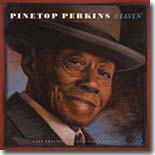 Those
of us who knew and loved Pinetop Perkins will
be thrilled to know that Blind Pig Records had a
studio performance from 1986 in the can and thought
so much of it to release it in both CD and
audiophile 180gm Vinyl versions. Heaven is a
treasure and kudos to the good folks at Blind Pig
for releasing it in such a loving fashion.
Those
of us who knew and loved Pinetop Perkins will
be thrilled to know that Blind Pig Records had a
studio performance from 1986 in the can and thought
so much of it to release it in both CD and
audiophile 180gm Vinyl versions. Heaven is a
treasure and kudos to the good folks at Blind Pig
for releasing it in such a loving fashion.
Pinetop opens with “44 Blues” and we find the master
of the ivories in fine fashion. Pine’s playing is
strong, his vocals clear and he’s happy to let us
know that since he found his baby, “ain’t going to
wear my 44 no more.” Our next cut, “4 O’Clock In the
Morning,” finds Pinetop working to regain the
affections of a woman that he cares about. “Tell my
baby…what can I do to change your mind…now you can’t
spoil me worrying…darling about that all the time.”
Pinetop wants her to make up her mind and let him
know where he stands. Sounds fair enough to me. The
tempo picks up on our next cut, “Relaxin,” an
instrumental with Pinetop just playing away. In my
mind’s eye I can see him bent over the piano,
concentrating on his playing and smiling back at
everyone.
“Sitting on Top of the World” is an especially
poignant track since Willie “Big Eyes” Smith
recorded vocals that were overdubbed on top of
Pinetop’s playing. This song is literally the last
vocal recording of Willie’s before he passed away
last September. His voice is strong and clear, a
fitting compliment to Pine’s playing. Next up is a
rousing version of “Just Keep On Drinking.” Here we
find Pinetop worrying about his woman and whether
she will continue to love him. His solution, “Just
keep on drinking and drive my blues away!” Don’t
think that will work but God bless Pinetop for
trying. Otis Clay lends his vocal talents to our
next cut, “Since I Fell for You.” Clearly at the top
of his game, Otis’s vocals convey the sweet agony of
the song and the associated misery that comes with
loving this woman.
Blind Pig was thoughtful enough to include a very
strong version of Pinetop’s classic, “Pinetop’s
Boogie Woogie,” and it’s a treat to hear such strong
piano playing from Pinetop on this version.
Definitely a gem and a wonderful inclusion. “Ida B”
is up next and here we find Pinetop looking for this
woman, Miss Ida B. Pine is clearly infatuated with
this woman as he lets us know, “in my dreams….I can
see Miss Ida B…now that’s the only time…only
time…that little girl keeps my company.” Evidently
it was not to be but Pinetop definitely has feelings
for Miss Ida B. Another of Pinetop’s favorites,
“Sweet Home Chicago”, is up next and Pinetop is
clearly engaged in telling us all about his
hometown, “sweet home Chicago!”
The next treat in store for us is another song
written by Pinetop, “Pinetop’s Blues,” and here we
find Pinetop all alone missing the good love of a
woman. “Now if you be true baby…I will be the same
to you…now always I’ll love you baby…so it won’t
matter what you do.” It’s nice to hear Pinetop
declare his love for this woman in his life and
hopefully she’ll reconsider her stance toward
Pinetop. Up next is Pinetop’s take on a jazz
standard, “Willow Weep For Me,” and this rare gem is
the only time that Pinetop recorded the song.
Pinetop’s touch is light and airy, indicating to me
his joy at tackling this tune.
The final cut on Heaven, “That’s All Right,”
is another reminder of just how wonderful Pinetop
was at the top of his game. A beautiful rendition
and a fitting way to conclude this treasure of
Pinetop’s work.
Blind Pig did an outstanding job of producing
Heaven, and while this may not be the last
hidden recording of Pinetop’s to make its way into
the world, this one is indeed a gem. Order it today
from Blind Pig Records on their website,
www.blindpigrecords.com, and join them in
supporting the Pinetop Perkins Foundation as well at
www.pinetopfoundation.org.
--- Kyle Deibler
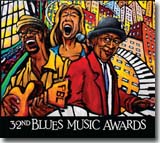 It’s been my pleasure to work the Blues Music Awards
the past several years and being on the floor all
night prohibits my ability to just enjoy the show
,so it’s always a pleasure to sit down and watch the
DVD of the show when it’s released. So I was very
happy to throw in the DVD of the 32nd Blues Music
Awards and just kick back.
It’s been my pleasure to work the Blues Music Awards
the past several years and being on the floor all
night prohibits my ability to just enjoy the show
,so it’s always a pleasure to sit down and watch the
DVD of the show when it’s released. So I was very
happy to throw in the DVD of the 32nd Blues Music
Awards and just kick back.
The disc opens with the duo of Kirk Fletcher and
Rick Estrin which is very entertaining. Rick has the
ability to play harp without using his hands and it
got me laughing early on. The appearance of Steve
Miller was next and Steve was amazing to work with.
The Blues Foundation worked hard over a period of a
couple of years to bring Steve to town, and he was
very appreciative of his time on stage.
It’s not my intent to go through the disc artist by
artist, but there were some very poignant moments
that I do want to convey. Reba Russell’s rendition
of “Red Mississippi Clay” was stellar and very well
done. It was hard not to appreciate the Nighthawks
first BMA win for Acoustic Album of the Year. Janiva
Magness’s thoughtful inclusion of Robin Rogers
husband, Tony Rogers, on stage for her rendition of
Robin’s “The Plan,” brought a tear to just about
everyone’s eye. And we’ll all be grateful to voters
for selecting Robin the Contemporary Female Artist
of the Year. Big Head Todd’s salute to Robert
Johnson, Tad Robinson’s to Solomon Burke and Delta
Groove’s win for Historical Album of the Year were
also personal highlights for me. And I would be
remiss if I didn’t mention Willie “Big Eyes” Tribute
to Pinetop Perkins in what would prove to be
Willie’s last appearance on the BMA stage.
But the night belonged to Buddy Guy. His disc,
Living Proof, was a much deserving winner for
several awards, including Album of the Year. And we
were all delighted to have Buddy there, playing his
heart out on the BMA stage. The DVD for the 32nd
Blues Music Awards is available on the Blues
Foundation website at
www.blues.org. So head on over there and pick up
all of the BMA DVDs while you’re shopping. And if
you’ve never been to Memphis for the BMAs, there’s
always the first time and tickets are still
available for this year’s show in May. See you
there!
--- Kyle Deibler
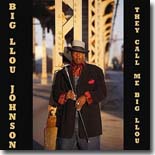 I’ve had the pleasure of working with Big Llou
Johnson over the past couple of years at the
Blues Music Award’s where’s he’s served as a master
of ceremonies for what is the highlight of the Blues
year. You also know Llou as the voice behind B.B.
King’s 10 commandments, and it was in that capacity
that Llou helped me get through one of my darkest
days when my sister passed away. Big Llou doesn’t
know the story, but I want to thank you now, big
man, for that. And I promise to share the story with
you soon.
I’ve had the pleasure of working with Big Llou
Johnson over the past couple of years at the
Blues Music Award’s where’s he’s served as a master
of ceremonies for what is the highlight of the Blues
year. You also know Llou as the voice behind B.B.
King’s 10 commandments, and it was in that capacity
that Llou helped me get through one of my darkest
days when my sister passed away. Big Llou doesn’t
know the story, but I want to thank you now, big
man, for that. And I promise to share the story with
you soon.
Fast forward to this year’s International Blues
Challenge. Big Llou posted on Facebook that anyone
with a Blues Society card should hit him up for a
copy of his new CD, They Call Me Big Llou. I
caught up with him on Beale Street and was
pleasantly surprised when I threw the disc in for a
spin. The big man can sing, and how.
The disc opens up with “They Call Me Big Llou”, an
open admission that Llou is not a little man. “They
call me Big Llou…cause I weigh 300 pounds…I can
stick and I can move…and I can really throw it
down!” Big Llou is definitely a gentleman, but make
no mistake about his intentions, “I can turn you
on…if you let me take you home…treat you like a
queen…and never do you wrong!”
We contrast this gentlemanly behavior with our next
cut, “Dogg.” Here we find Llou operating without any
false pretenses, “You know a player going to
play…run a game every day…what more can I say…I’m
just your average hound!” Llou’s on the prowl and
he’s just following his instincts. If you still have
any doubts at all, the next cut, “Git Me Some,” will
dispel any such foolish notions. “I don’t want you
baby…for the rest of my life…ain’t trying to be your
husband…ain’t trying to make you my wife…I ain’t
going to stay here baby…I don’t want to spend the
night…I’ll be gone by sun up and home…by the morning
light…just want to be your plaything…don’t even need
to be the one…and if the truth be told…I only want
to get me some!” I am absolutely positive that the
big man has more than gotten his share of “some.”
Russ Green’s soulful harmonica provides the sweet
intro for “Rock Me Baby.” Llou has a sweet baritone
voice that reminds me of another Lou --- Mr. Rawls
--- and Big Llou’s voice is very seductive as he
sings, “Rock me, baby…rock me all night long” in
very fine fashion. I hear trumpet in the background
as Llou moves onto “Flesh and Blood.” “Come sit
beside me…that will do for now…the night has come
and left me….just the light that you allow…come
speak my name….fill my head with all such foolish
dreams…my flesh and blood is no more real to me…than
what it seems.” Big Llou is definitely in love and
very appreciative of the woman who loves him so.
“Life is for the living…life comes hard for some…the
rest of us…we’re flesh and blood…meek and hard on
our own.” Both tempo and attitude pick up with our
next cut, “Your Sweetness is my Weakness”. “The way
you give me your sweet love…any place & time…when
you look at me…I get weak in the knees…every
time…your sweetness is my weakness!”
Llou’s playful attitude comes back out on “Three
Hundred Pounds of Joy.” “Take me baby…as your loving
toy…you’re getting 300 pounds of heavenly joy…this
is it…this is what you get.” Llou is honest to the
pound and he’s very happy to be this woman’s loving
toy. “This is it…this is it…look what you get!”
Llou closes his disc with a rendition of “Help Me.”
“Help me…I can’t do it all by myself…you gotta help
me…I can’t do it all by myself…if you don’t help me
baby….I’m going to find somebody else!” Llou is
clear on what he needs and if his current woman
won’t help him through, he will find someone else
that will.
I’ve enjoyed They Call Me Big Llou. The whole
disc reflects the playful side of Llou Johnson,
front and center, and that isn’t a bad thing. A nice
selection of tunes, a great band behind him and
Llou’s soulful vocals all contribute to an excellent
first effort by Big Llou and I’m looking forward to
his next disc as he continues to find his stride in
the Blues world. The disc was released on
Goldenvoice Audio Records and can be purchased on
their website,
www.goldenvoiceaudio.com. I strongly suggest
that you look the site up and “Get Yourself Some!”
--- Kyle Deibler
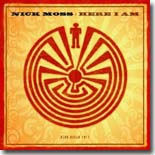 As
one who is a firm believer in the fact that Blues
music needs to continually evolve in order to
thrive, I really like what Jimmy Thackery had to say
about Nick Moss’ latest effort on Blue Bella
Records, Here I Am. “I’m really glad he’s
sticking his finger in the eyes of the “blues
police,” because the blues needs to evolve and grow
and change; otherwise…it stays stagnant and dies.”
Nick’s new disc pushes the boundaries for sure, so
let’s give it a listen.
As
one who is a firm believer in the fact that Blues
music needs to continually evolve in order to
thrive, I really like what Jimmy Thackery had to say
about Nick Moss’ latest effort on Blue Bella
Records, Here I Am. “I’m really glad he’s
sticking his finger in the eyes of the “blues
police,” because the blues needs to evolve and grow
and change; otherwise…it stays stagnant and dies.”
Nick’s new disc pushes the boundaries for sure, so
let’s give it a listen.
We start out with a hill country feel in “Why You So
Mean?” Here Nick has taken up with a girl from the
country and he’s finding that bringing her back to
the city was a bad idea…too many thoughts are
crawling through her mind. “Tell me momma…honey, why
you so mean…took you from the country and bought you
a wedding ring…You turned around and told your
friends I didn’t give you a God damned thing!” This
relationship went south in a hurry and Nick’s
solution is simple--- “I’m going to send you right
back…to that one room country shack.
Our next cut, “Blood Runs,” is about the working
class and the work everyone is doing just to
survive. “He’s earned the lines on his face; and the
dirt on his shoes…the grease on his hands…it ain’t
nothing new…Well now, blood runs, sweat
drips…Someone else is getting rich.” In this day and
age it takes two incomes to barely raise a family
and things aren’t getting any better. Up next is
“Here I Am,” and we find Nick being looked over by
the object of his affection and his he’s letting her
know she made a mistake. “Make no mistake, or place
a wrong bet…You misjudged by looking at the
cover…And it’s your own damn fault if you pass me
over!”
Up next is “Candy Nation” and Nick examines the fact
that there seems to be a pill for just about
everything. “Candy nation – What kind of medication?
Got all kinds of flavors…to make you feel
fine…Written prescription, get it filled in no
time.” Nick is right, its way too easy to have your
doctor write a script for whatever ails you…we all
need to work harder at our health and give the drugs
a rest.
“It’ll Turn Around” was the single released from the
disc and it’s a very sweet ballad, full of optimism
with a look to the future. “And the only thing…that
you need to know…it’ll turn around!” I first heard
this tune at Nick’s show in Phoenix late last fall
and it’s one that has definitely stuck with me. The
rocking “Long Haul Jockey” is our next cut and one
that finds Nick full of solutions. “I’m a long haul
jockey, on a late night run…I do my best driving,
all night long – yes all night long.” Definitely
open to interpretation and I’ll leave that one to
you.
I like Nik Skilnik’s driving bass line on “Here
Comes Moses.” Nick’s a simple man just making his
way through the world, but he has his own code to
follow and does that well, “We all have a strength
inside…it’s up to us to bring to light…I ain’t
looking for no damn trouble…But I won’t lay down in
a fight!” As long as you’re square with Nick, he’ll
be the same to you. “Caught by Surprise” finds Nick
in a quandary over a woman who definitely stole his
heart away and did him wrong. “That girl didn’t give
me no warning, nothin’ from the start…Didn’t care
how it felt, wanna rip my poor heart apart.” This
one appears to be a never ending source of trouble
so Nick should follow his doctor’s advice, “Tell
her…go and find some other fool….tear his heart
apart!” An apple a day will hopefully make this one
go away.
Up next is “Katie Ann,” a tribute to Nick’s wife and
an accomplished musician in her own right. Nick is
definitely not shy about telling Kate he loves her,
“I’ll tell the world I know, Yea the whole wide
world out to know…I’m gonna love you girl until the
day I die…” Nick’s a smart man and Kate is
definitely a keeper. I’m just saying.
Here I Am closes with an instrumental,
“Sunday Get Together,” and a radio edited version of
“It’ll Turn Around.” I applaud Nick for taking
chances and stretching the boundaries of his music.
I liked his last release, Privilege, and
definitely like this one even more. You can grab a
copy at any of his live shows, on the Blue Bella
website or at
www.nickmoss.com. Definitely a nice addition to
my CD collection and a disc I’m sure you’ll enjoy as
well.
--- Kyle Deibler